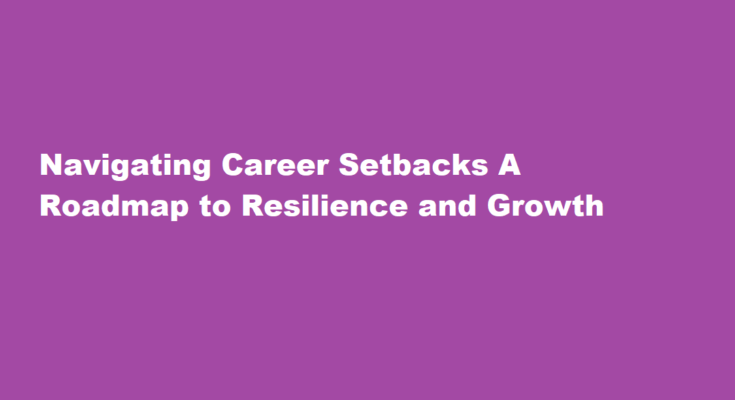Introduction
In the journey of professional life, setbacks are inevitable. Whether it’s a missed promotion, a layoff, or a project failure, career setbacks can be disheartening. However, how we respond to these challenges can shape our future success. This article aims to provide practical insights on how to handle career setbacks, emphasizing resilience and personal growth.
Embrace Emotional Resilience
Experiencing a setback can trigger a range of emotions, including frustration, disappointment, and self-doubt. It is essential to acknowledge and process these emotions rather than suppressing them. Seek support from trusted friends, family, or mentors who can provide a listening ear and valuable guidance. Embrace self-care practices like exercise, meditation, and journaling to maintain emotional well-being.
Reframe the Setback as an Opportunity
Instead of dwelling on the negative aspects of a setback, reframe it as an opportunity for learning and growth. Analyze the situation objectively, identifying areas where you can improve or acquire new skills. This perspective shift can help you see setbacks as stepping stones toward long-term success and open doors to new possibilities.
Evaluate and Learn from the Experience
Take time to reflect on the setback and evaluate what factors contributed to it. Was it a lack of specific skills, poor communication, or external circumstances beyond your control? Identify the lessons learned and develop a plan to address these areas. Seek feedback from colleagues or mentors to gain different perspectives and insights that can guide your future actions.
Develop a Resilience Mindset
Cultivate a mindset that embraces resilience and adaptability. Understand that setbacks are part of the journey and can be valuable opportunities for personal and professional development. Embrace challenges as learning experiences and view failures as temporary setbacks, not reflections of your worth or abilities. Focus on developing resilience, which will empower you to bounce back stronger from future setbacks.
Seek Growth Opportunities
Use setbacks as catalysts to propel your career forward. Engage in continuous learning and professional development by attending workshops, pursuing certifications, or enrolling in relevant courses. Seek out new challenges and projects that can expand your skill set. Additionally, network with professionals in your field to gain insights, explore new opportunities, and expand your professional connections.
Set Realistic Goals and Celebrate Progress
Set realistic goals that align with your long-term aspirations and break them down into manageable steps. Celebrate small victories along the way to maintain motivation and boost confidence. Acknowledge that setbacks are temporary detours on the road to success, and each step forward counts, regardless of the speed.
FREQUENTLY ASKED QUESTIONS
What are some career setbacks?
Career setbacks include not getting the job you want, getting laid off, being passed over for a promotion, missing out on a big project, and getting disciplined for poor performance.
What are setbacks symptoms?
Common emotional responses to painful treatment and treatment setbacks include feeling sad, depressed, irritable, angry, scared, or withdrawing from others. Some patients and families experience a setback as a failure rather than a “bump” in the road.
Conclusion
Handling career setbacks with resilience and a growth mindset is crucial for personal and professional development. By embracing emotional resilience, reframing setbacks as opportunities, and cultivating a mindset of continuous growth, setbacks can become springboards for future success. Remember that setbacks are not indicative of your worth or potential; they are simply stepping stones in the journey toward your goals. Embrace the lessons learned, seek growth opportunities, and stay committed to your path. With resilience and determination, you can navigate career setbacks and emerge stronger, wiser, and more resilient.
Read Also : Managing Work Stress Strategies for a Healthier Work-Life Balance



